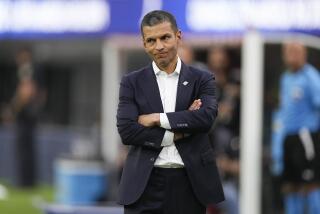Chaos Gives Way to Order in Italy
- Share via
ROME — If it were possible for a sporting event to take on human characteristics, the 14th edition of the World Cup, which concludes Sunday with a championship game between Argentina and West Germany, would have come to life as a rebellious teen-ager, a family’s black sheep. It repeatedly challenged soccer’s stern-jawed order with surprising results only a rebel would dare offer.
Only a rebel would eliminate Brazil and the Netherlands, two favorites, in the second round. Only a rebel would push Yugoslavia to within one missed penalty kick of the semifinals, and Ireland to the quarterfinals in its first Cup appearance. Only a rebel would allow little Costa Rica, also a Cup rookie, to beat Scotland and Sweden and advance to the second round.
Of course, only a rebel would revel in England’s fine run to the semifinals, a show accompanied by the constant brawling and lawlessness of the English hooligans, whose pathetic Drunks Over Italy tour led to daily arrests and came close to ruining the Cup experience for at least three cities. There is justice in the world if this collection of louts is consigned to the Bronx when the Cup comes to America in 1994.
The tournament’s best example of rebelliousness, though, was the Indomitable Lions of Cameroon, who beat Argentina in their first game, won their round-robin group and had a legitimate chance to bring the Cup home to their poor, troubled African nation, in what truly would have been one of the most remarkable stories in the history of sports.
Consider this line of thinking: The Lions came within five minutes of eliminating England in the quarterfinals, England proceeded to play West Germany to a dead heat in the semifinals and now West Germany will play an Argentina team that is lacking three starters. It is not that great a stretch to envision the Lions winning. They certainly belonged.
Now that the Cup field has been reduced to two teams, though, this strain of disorder has come to a sudden halt. It is as if the rebel suddenly has given up on his cause, or the black sheep has relented and agreed to go to law school. The championship game contains not an iota of anarchy. Out of chaos comes order: West Germany and Argentina have been the elite of this sport for more than a generation.
Argentina is bidding for its third championship in a dozen years. West Germany has made the final now in three straight Cups and five of the past seven. They are alone at the top. Brazil has not reached a final in 20 years. Italy has won only once since Mussolini reigned. England invented the game, but its only Cup victory came on home soil 24 years ago.
The only difference between West Germany and Argentina is that their rises were along different angles of incline. Argentina’s was sharp, a burst of Latin heat, a sudden ascension after decades as a soccer nonentity. West Germany assumed its place as soon as the country recovered its sporting legs after World War II, winning the Cup in its first post-War appearance, in 1954. Reflective of the organized, efficient German manner, the team’s standard has not fallen in 36 years.
Actually, and this is a fine way to start an argument, West Germany clearly is the world’s most consistently successful team since World War II. Brazil has won one more World Cup (3-2), but its standard has dropped while West Germany has reached the semifinals in all but two of the Cups since 1954, winning another in 1974, all the while using different generations of players but an unchanging style based on technical superiority, physical strength and mental toughness.
The Germans just do not give away a thing. In 1982, they rallied from a 3-1 deficit in overtime of a semifinal to eliminate France. Four years ago, with an aging team from which little was expected, they reached the final and then rallied from a 2-0 deficit to tie Argentina late in the second half, only to lose to a last fit of Diego Maradona brilliance at the end.
Argentina has no such tradition on which to call. The Argentines did make the final of the first Cup, in 1930, but after that they were reduced to being Brazil’s little brother from South America, advancing beyond the second round only once in the next 44 years. They won when the Cup came to their country in 1978, though, precipitating a soccer boom that resulted in the current generation of skillful players and Maradona.
The two teams have reached the final in Rome in decidedly different manners. West Germany, along with Italy, was the class of the tournament throughout, displaying the crisp, inventive offense so lacking in the rest of the field. Argentina has slogged through a succession of injuries, ejections and poor performances, scoring only five goals in six games and winning only two in regulation time.
This disparity has given rise to German confidence. “We are prepared to play Argentina and avenge our loss in the 1986 final,” said Franz Beckenbauer, the West German coach. “They have not improved since 1986, and we have improved a great deal. We are very confident.”
Before they get too carried away, the Germans should note that Argentina’s Cup record since 1978 is 18-4-3. Maradona’s team is difficult to beat. But regardless of who wins, the matchup is an ending few envisioned when the Cup began and Argentina lost to Cameroon, initiating the run of disorder that lasted until, well, until now.






